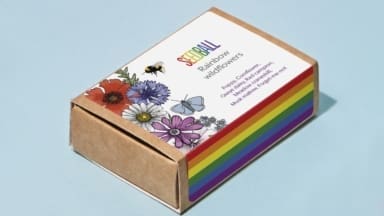
Pride month is a time dedicated to the celebration and commemoration of the LGBTQ+ community, its history, and achievements. Emily Lambert from Seedball said: “Pride Month is such an important time – it honours those who were part of the gay rights protests, paving the way for those of us who are part of the LGBTQIA+ community, as Ana and I are. It allows us to celebrate how far we’ve come, as well as breaking down barriers that are still prevalent in our society today. Using wildflowers to create a rainbow – whether that’s in a garden, a window box or balcony, pays homage to the vital work that Pride propagates, while also bringing a splash of colour and encouraging a more diverse ecosystem, creating benefits for years to come.”
The Seedball campaign, not only supports Pride month, but also boosts biodiversity and wildlife by attracting insect and pollinator populations. Growing wildflowers in a pot, a strip of lawn or in garden beds can help these vital insects survive and have an impact on our ecosystem.
For the campaign, Seedball has put together some of its most vibrant collections to invite that vital bursts of colour. The seed boxes are available in various sizes (pictured is the matchbox), and are filled with native wildflowers; poppy, cornflower, oxeye daisy, red campion, meadow cranesbill, musk mallow and forget-me-not.
Owned by Project Maya, a non-profit enterprise, Seedball was founded by two conservation scientists, Emily Lambert and Ana Attlee wanting to boost biodiversity and help wildlife. The unique products Seedball produces are balls made of clay and peat-free compost containing 30 – 100 seeds per ball, and a touch of chilli powder to deter slugs and snails. The company creates wildflower seedballs in mixed or single variety packages that are developed to help reverse the decline in pollinators and garden wildlife.

